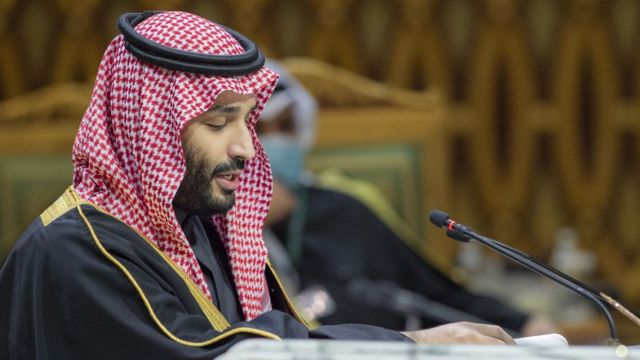
Saudi Arabia’s Crown Prince Just Got Even More Untouchable
by Fred Kaplan
At first glance, it may seem shrug-worthy that the king of Saudi Arabia has named his son, Crown Prince Mohammed bin Salman, to replace him as the country’s prime minister. MBS, as the prince is known, has already been running the country, while his ailing father has served as a figurehead, for some time.
But in fact, the promotion is likely a significant move, for reasons that have not been publicized: Assuming the title of prime minister protects the Crown Prince from a ruling of liability in a U.S. court—and possible arrest while traveling abroad—for his role in the 2018 murder of Saudi critic and American journalist Jamal Khashoggi.
First, let’s deal with the true power dynamics of the Saudi kingdom. When Barack Obama was president, I heard stories (which I’ve since confirmed) about two senior U.S. officials meeting with Saudi King Salman in his palace office. While talking, the king gazed at a picture frame on his desk. Off in a corner, the crown prince—who wasn’t so famous at the time—sat typing on his laptop. Gradually the officials realized what was going on: the dutiful son was typing what his ailing father, the king, should say; the picture frame was, in fact, an iPad (or some sort of tablet), and the king was reading aloud a script written by the prince.
It’s possible that the king—who is now 86 and in declining health—promoted his son this past Tuesday simply in order to preempt any challenges to his succession. Any uncertainties about the line should have been settled in 2017, when MBS detained dozens of members of the Saudi elite, including several cousins, keeping them locked up in luxury hotel suites—some for as long as a year—ostensibly on charges of corruption but also to compel their loyalty to the existing Royal Family power structure. Still, it’s conceivable that incipient challenges still loom, which this move would preempt.
But a more likely rationale for promoting the Crown Prince now is spelled out in a story by Stephanie Kirchgaessner in the Guardian (and confirmed to me by a former U.S. intelligence official who has kept up close contacts in the Middle East). Two years ago, Khashoggi’s fiancée filed a civil suit against MBS for kidnapping, torturing, and killing the journalist—an American resident who has sharply criticized the Royal family—inside the Saudi consulate in Turkey. The U.S. district judge in that case asked the Biden Administration to weigh in on whether MBS should be granted “sovereign immunity”—a concept, dating back to the Treaty of Westphalia in 1648, that, among other things, protects heads of state from being sued or tried in other countries. The Biden administration was given until Oct. 3—this Monday—to reply.
It is debatable whether a defense minister and deputy prime minister—the posts that MBS held until this week—could be considered a head of state. It is beyond debate that the prime minister is a head of state. Now that MBS is prime minister, President Biden has no say in the matter (no doubt, to his relief); MBS, promotion in hand, now has sovereign immunity.
It’s true that, even if MBS didn’t have sovereign immunity, U.S. authorities would have no way to enforce a judge’s ruling against him. However, if the judge were to rule in favor of Khashoggi’s fiancée, the Prince—if he remained mere deputy prime minister—could face legal troubles on any trips to the United States and, possibly, to other countries as well.. However, as prime minister, he can relax.
The U.S. intelligence community released a report last year, concluding that MBS “approved an operation” to “capture or kill” Khashoggi and that he wields total control over the elite guard that carried out the crime. The report was an unclassified summary of a much larger investigation conducted during the Trump presidency—though Trump ignored, even dismissed, its findings, choosing instead to believe MBS’ denials of any personal culpability. Trump also said that it would be unwise to cut off MBS, citing the American jobs created by the billions of dollars in arms sales to the Saudi kingdom. When he entered the White House, Biden said he would hold the Saudis accountable—and he has done so to a certain degree, ending the flow of certain weapons that the Saudis have used in Yemen. However, he has backpedaled in order to keep Saudi oil flowing, especially to European allies, after Russia’s invasion of Ukraine. Biden was put in a spot by the U.S. district judge’s request for a “statement of interest” in the civil suit against MBS. Now, the spot is erased.
Source: Slate
